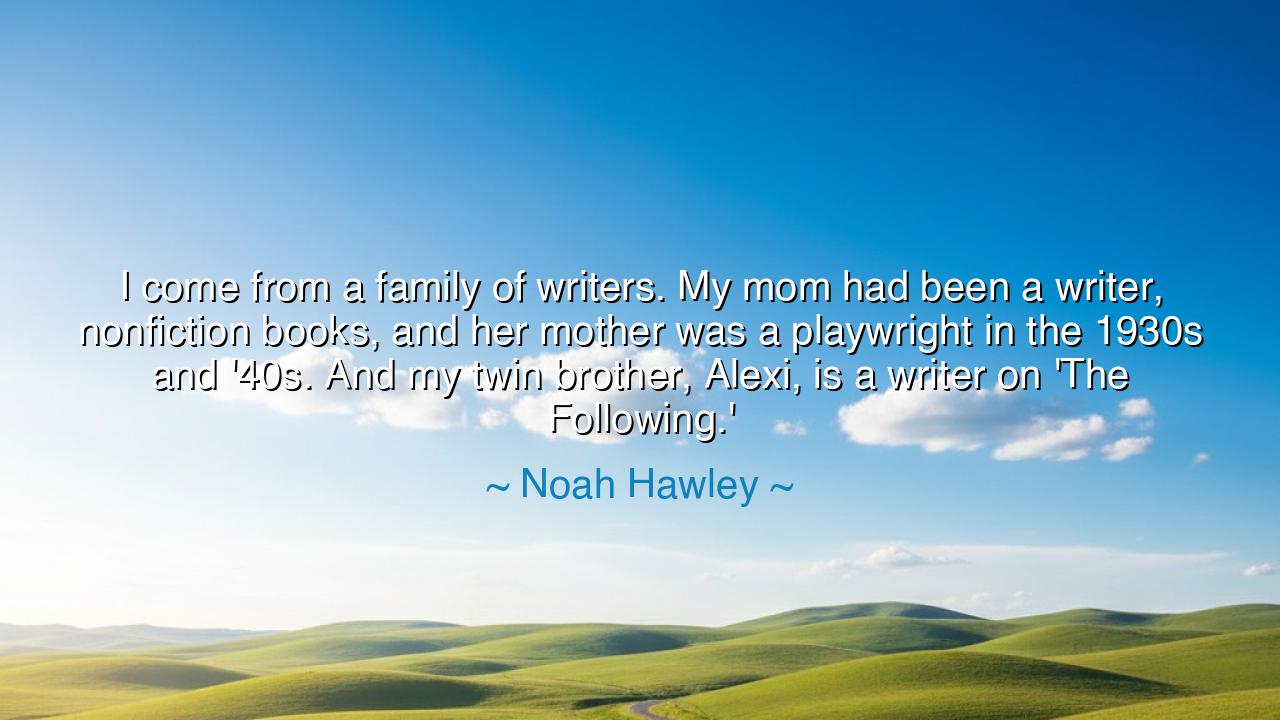
I come from a family of writers. My mom had been a writer
I come from a family of writers. My mom had been a writer, nonfiction books, and her mother was a playwright in the 1930s and '40s. And my twin brother, Alexi, is a writer on 'The Following.'






“I come from a family of writers. My mom had been a writer, nonfiction books, and her mother was a playwright in the 1930s and '40s. And my twin brother, Alexi, is a writer on 'The Following.'” — Noah Hawley
In these humble yet luminous words, Noah Hawley — the storyteller behind Fargo and Legion — speaks of heritage, of the mysterious and sacred thread that binds generations through art and imagination. His statement, though gentle, carries the weight of lineage — a truth the ancients understood well: that talent is not merely born, but inherited, cultivated, and passed like fire from one hand to the next. When Hawley says, “I come from a family of writers,” he is not merely identifying his profession; he is honoring the lineage of voices that shaped him — voices that spoke before him, and that now echo through him.
The ancients would have called this the lineage of the Muse, the divine inheritance of creativity that flows through bloodlines like a river through time. In ancient Greece, poets were said to be born of Calliope, the Muse of epic poetry — their inspiration a sacred trust handed down through generations. Likewise, Hawley’s mother, a writer of nonfiction, and her mother, a playwright of the 1930s and ’40s, represent a lineage of storytellers who each, in their time, gave shape to truth — one through fact, another through drama, both through vision. Their craft became the soil from which his imagination grew. His art, then, is not isolated genius, but the flowering of ancestral roots.
To be born into such a family is both gift and responsibility. The ancients taught that to inherit a craft is to inherit a covenant — the duty to honor what came before, and to add to it something new. Hawley’s acknowledgment of his mother and grandmother is not mere nostalgia; it is reverence. He recognizes that every story he tells, every character he writes, carries traces of the voices that nurtured him. This is how the human spirit endures — not through monuments of stone, but through stories, passed down like sacred flame from generation to generation.
When Hawley mentions his twin brother, Alexi, also a writer, he reveals another ancient truth: that creativity is not a solitary path, but a shared journey. Twins have long been symbols of duality and harmony — Castor and Pollux among the Greeks, Romulus and Remus among the Romans — pairs who balance one another’s strengths and fates. That both brothers write suggests a shared inheritance, not only of blood but of imagination — each expressing the family’s creative spirit in his own voice, like two branches of the same living tree. Such a lineage reminds us that inspiration is not confined to one soul, but lives in the collective heart of a family, a people, a culture.
There is a subtle heroism in the line about his grandmother, the playwright of the 1930s and ’40s. In an era when women’s voices were often confined to the margins, she wrote — she dared to speak through art. Her courage broke silence and laid the foundation for those who followed. The ancients would have called her a pioneer of spirit, one who challenged the boundaries of her age. It is no small thing that her grandson, decades later, crafts stories for the world that blend morality, myth, and mystery — her spirit living on through him. The playwright’s stage became the screenwriter’s world; the ink of one century became the light of another.
Hawley’s reflection also speaks to the power of legacy — not in the grandeur of fame, but in the quiet shaping of souls. The ancients taught that the truest inheritance is not gold or land, but virtue and craft. A family of warriors passes courage; a family of philosophers, wisdom; a family of artists, the gift of seeing. Hawley’s family passed him the eye that perceives meaning in chaos — the artist’s eternal gift. And through his acknowledgment, he reminds us that none of us stand alone. We are all the continuation of stories told long before we were born.
Let this, then, be the teaching drawn from his words: Honor the lineage that made you. Whether your ancestors wielded pens, plows, or prayers, you are the living echo of their strength. Know that the gifts you possess are not accidents, but callings — seeds planted long before your birth. Cultivate them with humility, for you are both heir and guardian. Write, build, sing, teach — whatever your craft may be — as though the eyes of your forebears watch through time, proud and expectant.
For as the ancients would say, the truest immortality is not to live forever, but to pass on that which makes life worth living. Noah Hawley’s family of writers teaches us that art, once born, never dies — it only changes hands. And so, the pen that once belonged to his grandmother now belongs to him, and one day, to another. This is the eternal rhythm of creation: each generation writes its chapter in the story of the soul.






AAdministratorAdministrator
Welcome, honored guests. Please leave a comment, we will respond soon